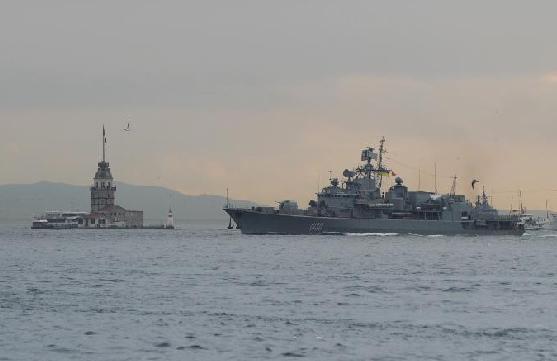How must China deal with Ukraine's turmoil?
- By Liu Zuokui
 0 Comment(s)
0 Comment(s) Print
Print E-mail China.org.cn, March 6, 2014
E-mail China.org.cn, March 6, 2014
|
|
|
A Ukrainian warship passes through Bosporus strait, Turkey, March 4, 2014, heading towards Ukraine. The Ukraine frigate, the Hetman Sahaydachny, escorted by a Turkish warship and a coast guard ship, accomplished its passage from the Bosphorus and sailed to the Black Sea on its way back to Ukraine. Earlier the same day, two Russian warships, the Saratov and the Yamal, also passed through the straight and headed to Ukraine. [Xinhua/Lu Zhe] |
Ukraine is a country with a huge development potential as well as one of the biggest unsaturated markets in the world, making it an alluring target for international strategic investors. However, from November 2013 onwards, the so-called Euromaidan protests have divided the country and laid bare its barriers to growth.
From February 18 to 20, 2014, the political turmoil came to its climax, with demonstrators occupying buildings in the center of Kiev and physically confronting police forces, leaving 98 dead and thousands injured. On February 22, parliament announced that the president was no longer able to fulfill his duties and exercise his constitutional powers. It set the new election date on May 25, 2014, to vote for a new president.
On March 1, Russia's parliament approved a request from President Vladimir Putin permitting the deployment of Russian troops to Ukraine, in response to the crisis. Currently, Russia has sent its troops to Crimea, an action condemned by both the United States and EU who now and plan to unite other Western countries to sanction Russia. Due to the very sophisticated game play from the different stakeholders, the future of Ukraine faces huge uncertainties; several Polish scholars have even predicted that a new Cold War might erupt in Europe.
How should China respond to the turmoil?
Ukraine is a key strategic partner for China. It is an important connectivity from the Asian to the European market on China's "Silk Road Economic Belt." Their cooperation in agriculture and the military have been successively enhanced over recent years. Its farmlands are already the object of several leasing schemes with China and could help to some extent secure Chinese food security. Strong military ties with Ukraine could help China build engines for fighter jets and improve its fighting capacities.
For these reasons, China had extended about US$10 billion in loans to Ukraine, even before the US$8 billion in Chinese investments promised at the end of 2013. In sum, we have huge strategic and investment interests in this eastern European country.
On the one side, we should "abide by the principle that the international community should play a constructive role in helping the relevant parties in Ukraine resolve their disputes through consultation and dialogue. We must take an objective, balanced and impartial stance to help restore political and social stability in Ukraine," as cited from China's Ministry of Foreign Affairs.
On the other hand, China should not act as spectator and proponent, but actively take part in the negotiation and consultation mechanism for a peaceful solution to the political crisis.
The author is an associate professor with and deputy head of the Department of Central and Eastern European Studies, Institute of European Studies, Chinese Academy of Social Sciences.







Go to Forum >>0 Comment(s)